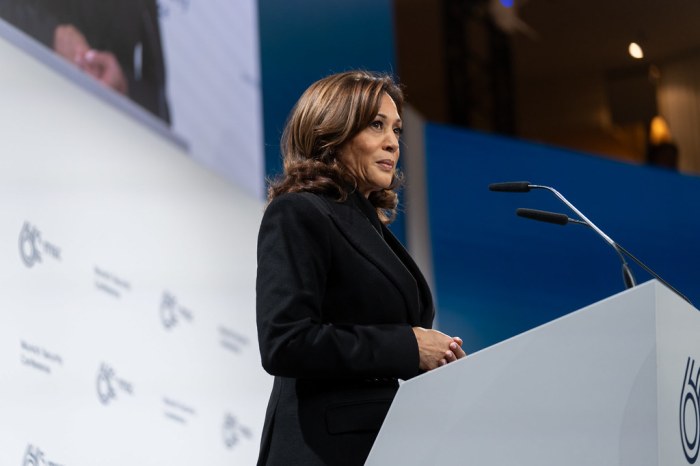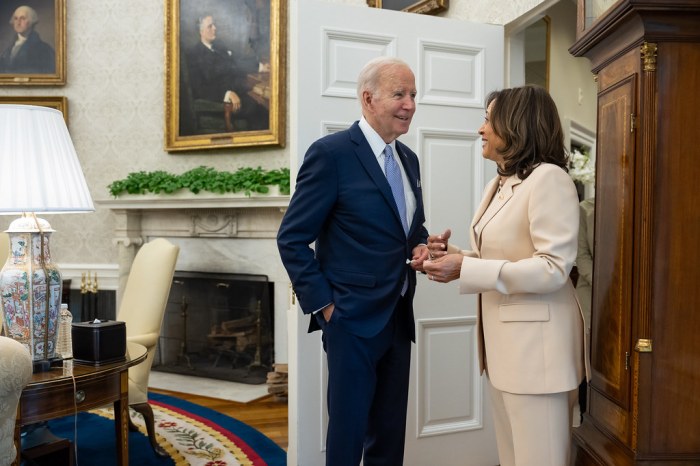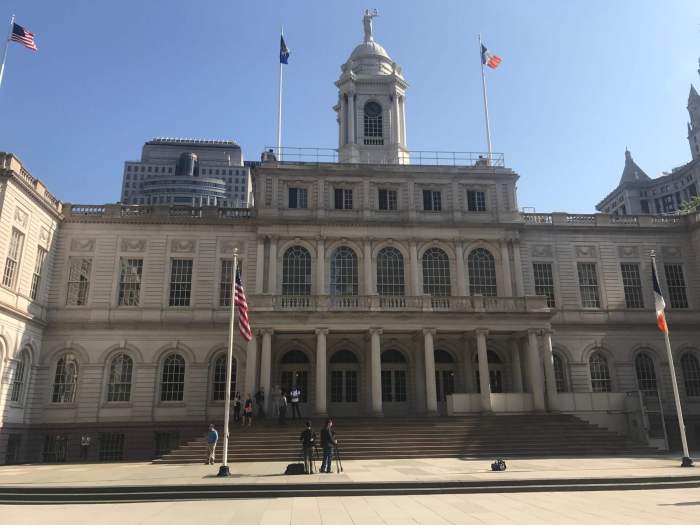Thomas K. Duane, the out gay Chelsea Democrat first elected to the New York State Senate in 1998, has announced he will not seek reelection this November.
“New York City is my home,” Duane said at a June 4 press conference, adding, “Yesterday, I went to see ‘Porgy and Bess’… I want to have more of those moments.” Other than saying he hopes to stay involved in “helping people” and “saving the world,” he was not specific about his plans come January 1.
Duane, who is 57, was elected to the Senate after serving seven years on the New York City Council, where he held the seat now occupied by Speaker Christine Quinn, an out lesbian who once served as his chief of staff. He made clear that his candidate to succeed him is Brad Hoylman, the chairman of Community Board 2 in the West Village, who has jumped into the race.
“Brad is one of my closest friends,” he said. “We talked last night. I would be proud to be represented by Brad Hoylman.”
“I would be proud to be represented by Brad Hoylman,” Duane said.
Hoylman, who had been expected to seek the City Council seat held by Quinn, who will be term-limited next year, told Gay City News, “Nothing would make me prouder than to continue Senator Tom Duane's legacy of being a champion for our community and those who normally don't have a voice in the halls of government. His 14-year legacy is without parallel. I hope to follow in Tom's progressive, activist footsteps and am humbled by his comments today. I would be extremely honored to have Tom's support for the State Senate.”
Hoylman's effort was also boosted by a June 4 endorsement from East Side Congresswoman Carolyn Maloney.
Congresswoman Carolyn Maloney also jumped in with a quick endorsement of Hoylman.
During Duane’s time in the Senate, the state enacted hate crimes legislation that included protections for gay and lesbian New Yorkers, adopted a gay rights law, and put in place school anti-bullying protections based on categories including sexual orientation and gender identity and expression –– all measures on which he served as lead sponsor.
The most significant advance for LGBT rights during Duane’s time in the Senate came in June 2011 when New York enacted a marriage equality law with the strong support of Democratic Governor Andrew Cuomo.
Enactment of gay marriage represented the pinnacle of Duane's work in 14 years in Albany.
In addition to those four measures, Duane was also the long-time sponsor of the Gender Expression Non-Discrimination Act (GENDA), a transgender civil rights measure passed five times in the Assembly but consistently stalled in the Senate. Over the past year, Duane handed off the lead sponsorship of that measure to his Democratic Senate colleague Daniel Squadron, who represents portions of Lower Manhattan and Brownstone Brooklyn.
With a mix of frustration and determination, Duane said he would press this year to secure enactment of a rent cap — pegged at 30 percent of their income — for clients of the HIV/ AIDS Services Administration who live in privately-owned housing, protection already afforded to HASA clients in public and congregate care housing. Dating back to at least the final years of the Pataki administration, Duane, Assemblywoman Deborah Glick, and AIDS advocates, including Voices of Community Activists & Leaders (VOCAL), have pushed to end an anomaly in state law that forces HASA clients without rental cap protection to pay up to 70 percent of their income on housing, leaving them with less than $15 per day for their other expenses.
The measure, passed twice by the Senate, was vetoed in 2010 by then Governor David Paterson. “I will never understand why Governor Paterson vetoed the bill,” Duane said. “It was not the Governor Paterson I thought I knew.”
The former governor was under significant pressure from the Bloomberg administration, which produced an analysis saying the rent cap law would cost the city and the state $15 million per year each. An analysis by the City Council countered that extending the rent cap would cost about $4 million in start-up costs, but would be no worse than revenue-neutral in later years, an objective that Paterson, burdened by a huge budget deficit, said he required.
Asked if he had the support of Governor Andrew Cuomo on the measure, Duane noted that it first needed to be approved by the Senate and Assembly. “I’ll need everyone’s help to make sure it gets signed,” he said.
A spokesman for the governor did not immediately respond to a request for comment on the legislation.
In 1994, after only three years on the Council, Duane challenged West Side Congressman Jerry Nadler, who was finishing up his first term, in the Democratic primary. Nadler had been appointed by party leaders to run as the Democratic candidate in 1992 when incumbent Democrat Ted Weiss died suddenly during the fall election campaign, so he was considered potentially vulnerable. In a district that included sections of Brooklyn as well as Manhattan, however, Nadler dispatched Duane by a roughly two-to-one margin.
While on the Council, Duane fought hard to keep the administration of Mayor Rudy Giuliani accountable for the performance of HASA, then known as the Division of AIDS Services (DAS). The former mayor quickly abandoned plans early in his first administration to dismantle DAS as a one-stop agency making government support services available to people living with the virus at a time when the death toll from AIDS continued to surge in the city. Duane joined with activists in a massive march on City Hall to push back on the new mayor’s plans, and he succeeded in having the agency enshrined in law.
Duane also worked to enact the state’s first domestic partnership law, but the contentious relationship between him and Giuliani frustrated his efforts. Shortly after the ex-mayor’s 1997 reelection race –– in which the Empire State Pride Agenda remained neutral, rather than endorse his opponent, Manhattan Borough President Ruth Messinger, a vocal gay rights supporter –– the mayor pushed through his own domestic partnership law, similar to Duane’s, but gave the gay councilman no credit.
Besides Hoylman, potential candidates for Duane’s seat that have been mentioned include Corey Johnson, the out gay chairman of Chelsea’s Community Board 4, Yetta Kurland, a lesbian who ran a strong challenge against Quinn in 2009, East Side Assemblyman Brian Kavanagh, and West Side City Councilwoman Gail Brewer. Kurland, Kavanagh, and Brewer did not respond to requests for comment.
In a statement praising Duane, Johnson, noting that he too has been considering a run for the Quinn seat next year, said, “I will be weighing this decision very carefully in the coming days, and will make an announcement in due course. Right now, however, I ask that we lay the question aside and instead focus on honoring a true leader and pioneer, Senator Tom Duane.”
Kurland has been expected to run for the Quinn Council seat next year, as well..
A spokesman for Assemblywoman Deborah Glick, an out lesbian who is a 22-year Albany veteran, knocked down speculation in the New York Times that she would jump into the State Senate race.
The Democratic primary for Duane’s seat is September 13, and petitioning for primary begins this week.




































